IT'S SPRING IN NORTH AMERICA
|
PRESS RELEASE: WADADA LEO SMITH'S CREATE FESTIVAL 2017
Legendary composer and trumpeter Wadada Leo Smith presents the CREATE Festival, April 8 & 9, 2017 at Firehouse 12 in New Haven, CT 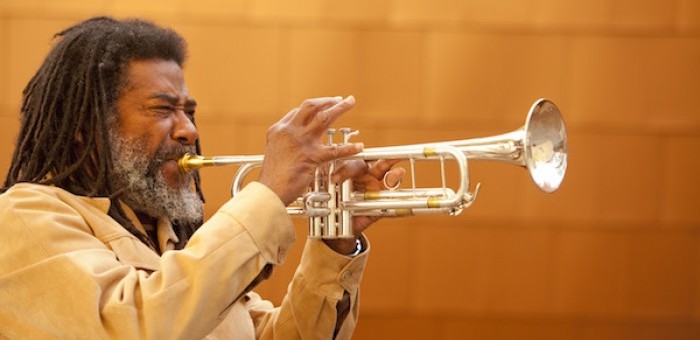
Legendary composer and trumpeter Wadada Leo Smith presents
the CREATE Festival, April 8 & 9, 2017 at Firehouse 12 in New Haven, CT The first-ever celebration of Smith’s visionary compositions features five ensembles performing classic works and several world premieres as well as other performances World premiere live performance of America’s National Parks “Smith uses his magisterial instrumental voice, his inspirational leadership and his command of classical, jazz and blues forms to remind us of what has gone down and what's still happening.” -Bill Meyer, DownBeat’s 80 Coolest Things in Jazz Today “A trumpeter and composer of penetrating insight.” -Nate Chinen, The New York Times
Visionary composer and trumpeter Wadada Leo Smith presents the first-ever CREATE Festival, a two-day celebration and exploration of his inventive and unclassifiable music that will feature classic works alongside world premiere performances. Taking place Saturday and Sunday, April 8 and 9, 2017 at Firehouse 12, 45 Crown Street, New Haven, Connecticut, the festival will include performances by five separate ensembles as well as seminars discussing Smith’s singular compositional innovations. Tickets are $30 for each of the seminars and each of the concerts; $55 for two events; $80 for three events and $100 for all four CREATE Festival events. For information, please go to http://firehouse12.com/ or call 203-785-0468.
“This idea has been in a dream state for many, many years,” Smith says. That long-cherished dream has been realized in part due to support from the Doris Duke Charitable Foundation, which awarded Smith the Doris Duke Artist Award in 2016. The festival offers a thrilling, rare opportunity to delve deeply into the full scope of Smith’s sui generis compositional voice and approach, which – in their category-defying range and breadth – can only be classified using Smith’s preferred term, “Creative Music.” The eclectic weekend will include two unique trios, each featuring unusual, ingenious instrumentation; three of the composer’s most recent works for string quartet, the latest entries in an oeuvre now spanning more than five decades; a vocal oratorio; the world premiere performance, over two nights, of Smith’s latest epic composition, “America’s National Parks,” and Smith performing A Thelonious Reflection on solo trumpet. In addition, Saturday’s concert will kick off with a short set by Wadada’s 21-year-old grandson, guitarist Lamar Smith and his trio. Both evenings’ concert programs will culminate with “America’s National Parks” by Smith’s newly-expanded Golden Quintet: Smith, pianist Anthony Davis, bassist John Lindberg, drummer Pheeroan akLaff, and cellist Ashley Walters. Cuneiform’s 2-CD recording of the suite last year was widely acclaimed, taking its place at or near the top of most annual lists of the year’s best releases. JazzTimes wrote that the album “unites political engagement with a soul-deep connection to nature… rich with ineffable majesty, [the suite] fully engages with tensions at the heart of the American experience.” Saturday’s line-up includes a newly-composed piece for the trio New Dalta Ahkri, in which Smith is joined by saxophonist and flutist Dwight Andrews and vibraphonist Bobby Naughton. That trio, Smith says, continues to expand concepts inaugurated with his influential early trio, the Creative Construction Company, with fellow AACM pioneers Anthony Braxton and Leroy Jenkins. “That trio set the pace for the idea of an ensemble that didn't have a set bottom, middle and top,” he says. “It sits in a zone that’s quite unique.” The evening continues with “Dark Lady of the Sonnets,” a piece dedicated to Billie Holiday and originally recorded in 2011, by Smith’s Mbira trio with akLaff and pipa virtuoso Min Xiao-Fen. Mbira will then be joined by the RedKoral Quartet, a string quartet specially assembled to perform Smith’s music, and a pair of vocalists for excerpts from his “Rosa Parks Oratorio,” originally premiered during the 2016 FONT Festival of New Trumpet Music. The Oratorio, Smith says, “is not a portrait of Rosa Parks. It’s my view of how she generated her ideas, her courage and her notions about how to resolve conflict.” The RedKoral Quintet, comprising longtime collaborators Shalini Vijayan and Mona Tian (violin), Lorenz Gamma (viola) and Ashley Walters (cello), will then premiere Smith’s “String Quartet No. 9” and the first movement of “String Quartet No. 10,” two of the latest in a book of music begun in the mid-1960s. “No. 9” features four movements dedicated to female African-American pioneers in music and the Civil Rights movement (Ma Rainey, Marian Anderson, Rosa Parks, and Angela Davis), while “No. 10” was inspired by the legendary Duke Ellington and also features pianist Anthony Davis. Sunday’s concert begins with A Thelonious Reflection featuring Smith on solo trumpet in selections from his upcoming TUM recording Alone: Reflections and Meditations on Monk. The Crystal Sextet, an ensemble combining four violas (Stephanie Griffin, Gwen Lester, Tanya Kalmanovitch and Jason Kao Hwang) with Smith’s trumpet and electronics by New York-based sound designer Hardedge will then perform Smith’s 12th Viola Quartet, the “Pacifica,” which was premiered at the 2016 Vision Festival. Several of the works will be supplemented by images provided by video artist Jesse Gilbert, who Smith says adds integral visual context to the aural elements. “The music and imagery don’t move in separate streams,” he says. “They’re actually intimately connected and responsible for each other, allowing us to create a narrative that transcends space and time. It’s twofold: there’s a technical and musical connection, and then there’s a psychological and historical connection that help to provide for comprehension of the work.” In order to further that comprehension, Smith (aided again by Gilbert’s images) will offer two afternoon seminars during the weekend, one to elaborate on several of the compositions and the inspirations and approaches behind them, and one to offer insights into his symbolic musical language, Ankhrasmation. Both seminars will be accompanied by premium coffee brewed by Wadada himself and Creole gumbo prepared by Gianna Chachere, executive director and founder of New Orleans arts organization The New Quorum. Smith chose New Haven’s Firehouse 12 as the ideal venue for the CREATE Festival, calling it “almost a perfect place to play. The size is intimate enough that everybody in the space will feel that they’re part of the performance and can have a clear, engaged audio and visual experience. It’s a strong center for music in Connecticut.” As with every performance, Smith sees the overall festival as a work in itself, which he calls “Kosmic Music: A Sonic Spectrum of Crystallized Rhythm: Pure – In Eight Parts with Five Ensembles.” In the end, Smith hopes that audiences who attend the festival will come away “with a deeper understanding of how I make my art. I expect that they’ll be more informed about what my music is and therefore they can create a deeper level of appreciation for what I do. Ultimately I wish to create a dialogue about issues of liberty, democracy, art and the connection between human beings.”
CREATE Festival is made possible by the generous funds from Doris Duke Foundation, Creative Capital, and private donations.
|
PRESS RELEASE: WADADA LEO SMITH'S AMERICA'S NATIONAL PARKS
Legendary composer and trumpeter
Wadada Leo Smith
creates a new masterwork
inspired by the country's most stunning landscapes
The epic America’s National Parks
released by Cuneiform
features Smith's newly expanded Golden Quintet
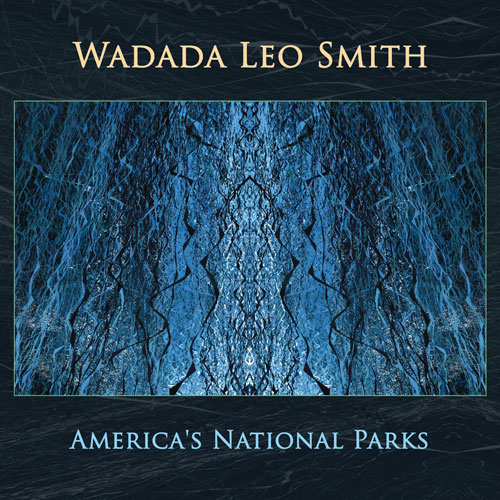
WADADA LEO SMITH
AMERICA’S NATIONAL PARKS
 STREAM/SHARE:
STREAM/SHARE:"New Orleans: The National Culture Park USA 1718 [Excerpt]"
stream: @SoundCloud / @Bandcamp / @YouTube
Cat. #: Rune 430/431, Format: 2xCD / Digital Download
Release Date: October 14, 2016=
With America’s National Parks, visionary composer and trumpeter Wadada Leo Smith offers his latest epic collection, a six-movement suite inspired by the scenic splendor, historic legacy, and political controversies of the country’s public landscapes. Writing for his newly expanded Golden Quintet, Smith crafts six extended works that explore, confront and question the preserved natural resources that are considered the most hallowed ground in the U.S. – and some that should be.
The two-CD America’s National Parks will be released on October 14 on Cuneiform Records, shortly before Smith’s 75th birthday in December. It arrives, coincidentally, in the midst of celebrations for the centennial of the National Park Service, which was created by an act of Congress on August 25, 1916. The spark for the project, however, came from two places: Smith’s own research into the National Park system, beginning with Yellowstone, the world’s first national park; and Ken Burns’ 12-hour documentary series The National Parks: America’s Best Idea.
“The idea that Ken Burns explored in that documentary was that the grandeur of nature was like a religion or a cathedral,” Smith says. “I reject that image because the natural phenomenon in creation, just like man and stars and light and water, is all one thing, just a diffusion of energy. My focus is on the spiritual and psychological dimensions of the idea of setting aside reserves for common property of the American citizens.”
His 28-page score for America’s National Parks was penned for his Golden Quintet, a fresh reconfiguration of the quartet that’s been a keystone of his expression for the last 16 years. Pianist Anthony Davis, bassist John Lindberg and drummer Pheeroan akLaff are joined by cellist Ashley Walters, affording the composer and bandleader new melodic and coloristic possibilities. “The cello as a lead voice with the trumpet is magnificent,” Smith says, “but when you look at the possibilities for melodic formation with the trumpet, the cello, the piano and the bass, that’s paradise for a composer and for a performer. My intent was to prolong or enhance the vitality of the ensemble to live longer.”
That’s an enticing prospect given the vigor and daring on bold display throughout America’s National Parks. Where many composers would be seduced into romantic excess by the sweeping vistas and majestic panoramas of Yellowstone’s grand waterfalls or Kings Canyon’s towering redwoods, Smith takes a far more investigative and expansive view, with inventive and complex scores that prompt stunning improvisations from his ensemble. In fact, he has yet to visit many of the parks paid homage in the pieces, opting instead for thorough historical research.
“You don't really need to visit a park to write about a park,” Smith insists. “Debussy wrote ‘La Mer,’ which is about the sea, and he wasn’t a seafaring person. I would defend his right to do that, and I would contend that ‘La Mer’ is a masterpiece that clearly reflects his psychological connection with the idea of the sea.”
The idea of the parks, rather than their physical and geographical beauty, is central to Smith’s conception for this music. In its marrying of natural landmarks and political challenges it can be traced back to both of the composer’s most recent epic masterpieces, The Great Lakes and especially Ten Freedom Summers. “It became a political issue for me because the people that they set up to control and regulate the parks were politicians,” Smith says. “My feeling is that the parks should be independent of Congress and organized around an independent source who has no political need to be reelected. So it’s a spiritual/psychological investigation mixed with the political dynamics.”
Smith’s suite also takes inventive liberties with the definition of a “national park;” half of its inspirations aren’t, technically speaking, considered as such. The album opens with “New Orleans: The National Culture Park,” which argues that the entire Crescent City deserves to be recognized for its influential contributions to American history and culture. “New Orleans was the first cultural center in America and therefore it produced the first authentic American music,” Smith says.
The second piece, “Eileen Jackson Southern, 1920-2002: A Literary National Park,” takes an even broader view, suggesting that the African-American musicologist, author and founder of the journal The Black Perspective in Music, to which Smith has contributed, should be honored for her efforts to document a musical common ground shared by all Americans. Another piece represents the “Deep and Dark Dreams” of the Mississippi River, which Smith calls “a memorial site which was used as a dumping place for black bodies by hostile forces in Mississippi. I use the word ‘dark’ to show that these things are buried or hidden, but the body itself doesn’t stay hidden; it floats up.”
The other three pieces are based on more conventionally recognized national parks: Yellowstone, which became the first place in the world so designated in 1872; Sequoia & Kings Canyon, whose trees Smith marvels at as some of the largest and oldest living things on the planet; and Yosemite, which contains striking glaciers and some of the deepest lakes in the world.
America’s National Parks arrives at a time of prolific imagination and universal renown for the composer. Earlier this year Smith, part of the first generation of musicians to come out of Chicago’s AACM (Association for the Advancement of Creative Music), was the recipient of a 2016 Doris Duke Artist Award and an honorary doctorate from CalArts. In March ECM released a cosmic rhythm with each stroke, a duo recording with pianist Vijay Iyer.
While these preserved landscapes offer the inspiration of powerful natural beauty, Smith’s always open-minded view of the world leads him to find that same inspiration wherever he is. “Every concrete house is from nature,” he says. “Every plastic airplane that flies 300 people across the ocean comes out of nature. Every air conditioner conditions a natural piece of air. I think that the human being is constantly enfolded in organic nature and constructed nature, so I’m constantly inspired, inside the house or outside the house.”
Smith’s suite also takes inventive liberties with the definition of a “national park;” half of its inspirations aren’t, technically speaking, considered as such. The album opens with “New Orleans: The National Culture Park,” which argues that the entire Crescent City deserves to be recognized for its influential contributions to American history and culture. “New Orleans was the first cultural center in America and therefore it produced the first authentic American music,” Smith says.
The second piece, “Eileen Jackson Southern, 1920-2002: A Literary National Park,” takes an even broader view, suggesting that the African-American musicologist, author and founder of the journal The Black Perspective in Music, to which Smith has contributed, should be honored for her efforts to document a musical common ground shared by all Americans. Another piece represents the “Deep and Dark Dreams” of the Mississippi River, which Smith calls “a memorial site which was used as a dumping place for black bodies by hostile forces in Mississippi. I use the word ‘dark’ to show that these things are buried or hidden, but the body itself doesn’t stay hidden; it floats up.”
The other three pieces are based on more conventionally recognized national parks: Yellowstone, which became the first place in the world so designated in 1872; Sequoia & Kings Canyon, whose trees Smith marvels at as some of the largest and oldest living things on the planet; and Yosemite, which contains striking glaciers and some of the deepest lakes in the world.
America’s National Parks arrives at a time of prolific imagination and universal renown for the composer. Earlier this year Smith, part of the first generation of musicians to come out of Chicago’s AACM (Association for the Advancement of Creative Music), was the recipient of a 2016 Doris Duke Artist Award and an honorary doctorate from CalArts. In March ECM released a cosmic rhythm with each stroke, a duo recording with pianist Vijay Iyer.
While these preserved landscapes offer the inspiration of powerful natural beauty, Smith’s always open-minded view of the world leads him to find that same inspiration wherever he is. “Every concrete house is from nature,” he says. “Every plastic airplane that flies 300 people across the ocean comes out of nature. Every air conditioner conditions a natural piece of air. I think that the human being is constantly enfolded in organic nature and constructed nature, so I’m constantly inspired, inside the house or outside the house.”
****
2016 is the 100th Anniversary of the
National Park Service
"The national parks represent an idea born in this country, as uniquely American as the Declaration of Independence and just as radical:
that the most magnificent and sacred places in our nation should be preserved,
not for royalty or the rich,
but for everyone."
- Ken Burns & Dayton Duncan
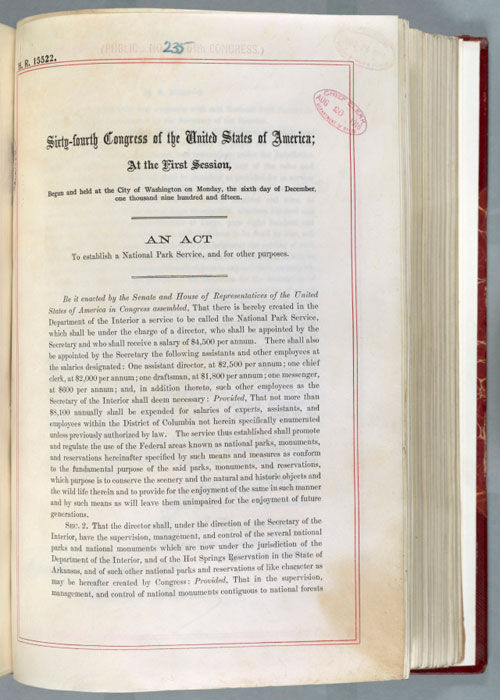
An Act to Establish a National Park Service, 8/25/1916.
(General Records of the U.S. Government, National Archives)
On August 25th, 1916, the Organic Act was signed into power by President Woodrow Wilson, the 28th President of the United States, creating the National Park Service “to conserve the scenery and the natural and historic objects and the wild life therein, and to provide for the enjoyment of the same in such manner … as will leave them unimpaired for the enjoyment of future generations.” The idea of creating National Parks - setting aside land to be owned by the American people in perpetuity, for the public's pleasure and national pride - was an American innovation. The first example of this dates back to 1872, when the US federal government under President Ulysses S. Grant designated Yellowstone as a "public park or pleasuring-ground for the benefit and enjoyment of the people," creating the first and oldest National Park in the world. The concept of national parks spread worldwide as the US designated additional parks and other nations began to establish their own. The 1916 Organic Act ensured the future of America's National Parks by creating a special federal bureau under the U.S. Department of the Interior to be their stewards, and to manage and preserve them.
The National Archives in Washington DC displayed the Organic Act of 1916 in a special exhibit throughout August 2016. Other celebrations honoring the National Parks Centennial (National Park Service Centennial) are being held across the U.S. through 2016. For more info, please see: National Park Service (https://www.nps.gov/subjects/centennial/index.htm) and National Park Foundation (http://www.nationalparks.org/our-work/celebrating-100-years-service)
The National Park Service is overseen by the U.S. Department of the Interior's Assistant Secretary for Fish, Wildlife and Parks.
The National Archives in Washington DC displayed the Organic Act of 1916 in a special exhibit throughout August 2016. Other celebrations honoring the National Parks Centennial (National Park Service Centennial) are being held across the U.S. through 2016. For more info, please see: National Park Service (https://www.nps.gov/subjects/centennial/index.htm) and National Park Foundation (http://www.nationalparks.org/our-work/celebrating-100-years-service)
The National Park Service is overseen by the U.S. Department of the Interior's Assistant Secretary for Fish, Wildlife and Parks.
Info on the Organic Act & National Parks from:
https://en.wikipedia.org/wiki/National_Park_Service_Organic_Act
https://en.wikipedia.org/wiki/National_park
https://en.wikipedia.org/wiki/National_Park_Service
“The national parks are more than landmarks, monuments, and territories,
more than mountains, forests, lakes, and geologic wonders.
They represent a piece of the American soul.” - Edwin Bernbaum
https://en.wikipedia.org/wiki/National_Park_Service_Organic_Act
https://en.wikipedia.org/wiki/National_park
https://en.wikipedia.org/wiki/National_Park_Service
“The national parks are more than landmarks, monuments, and territories,
more than mountains, forests, lakes, and geologic wonders.
They represent a piece of the American soul.” - Edwin Bernbaum
Cuneiform Records' release of Wadada Leo Smith's America's National Parks auspiciously coincides with the 2016 National Parks Centennial celebrations. Wadada Leo Smith is one of America's leading composers and trumpeters and one of the most respected creative musicians in the world. His recordings and performances have been acclaimed by the international music press, and the Ankhrasmation scores he creates for some music are now in the art world's spotlight, currently exhibited at the Hammer Museums' Made in L.A. 2016 exhibit and lauded with a 2016 Mohn Award. Smith's prior release on Cuneiform was Ten Freedom Summers, a four-disc set celebrating the American Civil Rights Movement, for which he was named one of the 3 finalists for the 2013 Pulitzer Prize for Music. America's National Parks follows in the musical, conceptual/political and spiritual footsteps of Ten Freedom Summers, continuing Smith's dedication to celebrating America's best ideas, most monumental achievements, and most noble ideals.
"My focus is on the... idea of setting aside reserves for common property of the American citizens: those who have passed on before, those who are here in the present, and those who will come in the future. The...collective notion about common property, inheritance, longevity, transformation, and sustaining beauty down the line...”
-Wadada Leo Smith
-Wadada Leo Smith
PROMOTIONAL TRACK //
If you'd like to share music from this release, please feel free to use the following track:
 "New Orleans: The National Culture Park USA 1718 [Excerpt]":
"New Orleans: The National Culture Park USA 1718 [Excerpt]":@SoundCloud / @Bandcamp / @YouTube
AMERICA’S NATIONAL PARKS TRACK LISTING //
CD 1
1. New Orleans: The National Culture Park USA 1718 (20:57)
2. Eileen Jackson Southern,1920-2002: A Literary National Park (9:38)
3. Yellowstone: The First National Park and the Spirit of America – The Mountains, Super-Volcano Caldera and Its Ecosystem 1872 (12:14)
CD 2
4. The Mississippi River: Dark and Deep Dreams Flow the River – a National Memorial Park c. 5000 BC (31:07)
5. Sequoia/Kings Canyon National Parks: The Giant Forest, Great Canyon, Cliffs, Peaks, Waterfalls and Cave Systems 1890 (6:46)
6. Yosemite: The Glaciers, the Falls, the Wells and the Valley of Goodwill 1890 (15:23)
ALBUM CREDITS //
Golden Quintet
Wadada Leo Smith: trumpet, director of the ensemble
Anthony Davis: piano
Ashley Walters: cello
John Lindberg: bass
Pheeroan akLaff: drums
Jesse Gilbert: video artist
Music composed by Wadada Leo Smith.
Recorded on May 5, 2016 and mixed by Nick Lloyd at Firehouse 12 Recording Studio, New Haven, CT.
Mastered by Gene Paul at G&J Audio, Union City, NJ.
Art and Yosemite National Park photography by Jesse Gilbert.
Wadada photo: R.I. Sutherland-Cohen
Anthony photo: Erik Jepsen
Ashley photo: Tim Coburn
John photo: Sotiris Kontos
Pheeroan photo: Jimmy and Deena Katz
Jesse photo: Mona Tian
Package design by Bill Ellsworth.
PURCHASE //
ITUNES - AMAZON - BANDCAMP [HD 96khz/24 bit] - WAYSIDE MUSIC
ARTIST WEB SITES //
www.wadadaleosmith.com - www.twitter.com/WadadaLeoSmith - www.cuneiformrecords.com

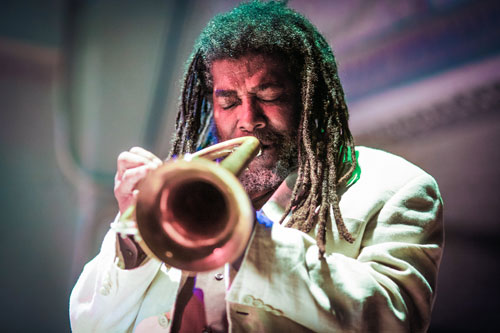
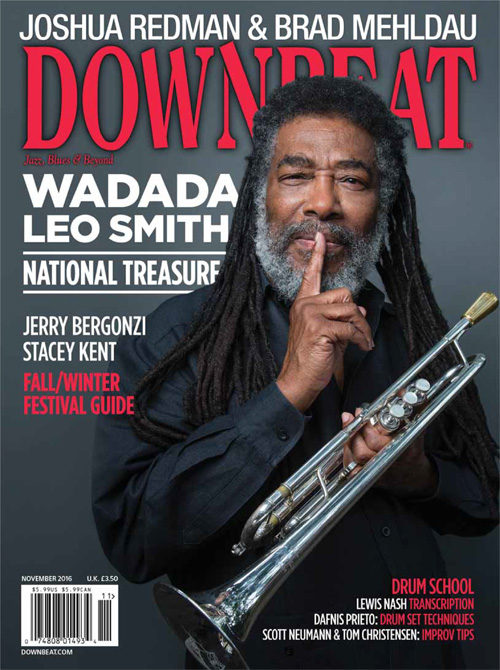
No comments:
Post a Comment